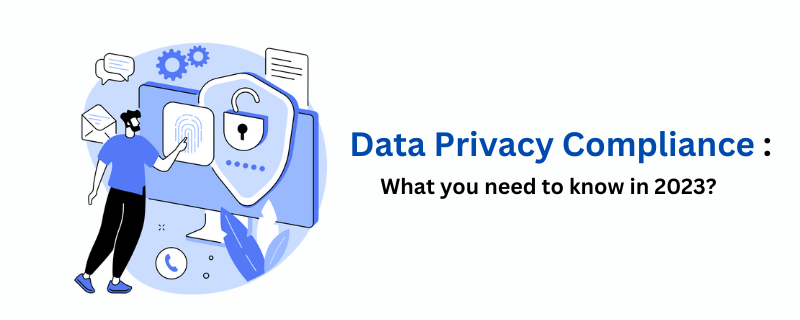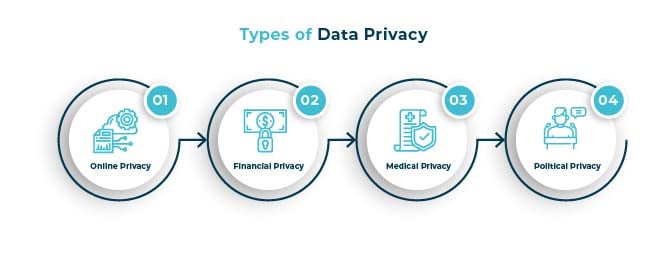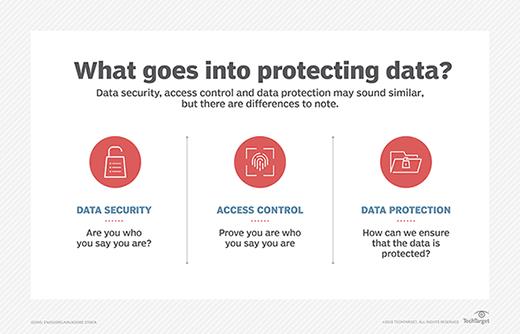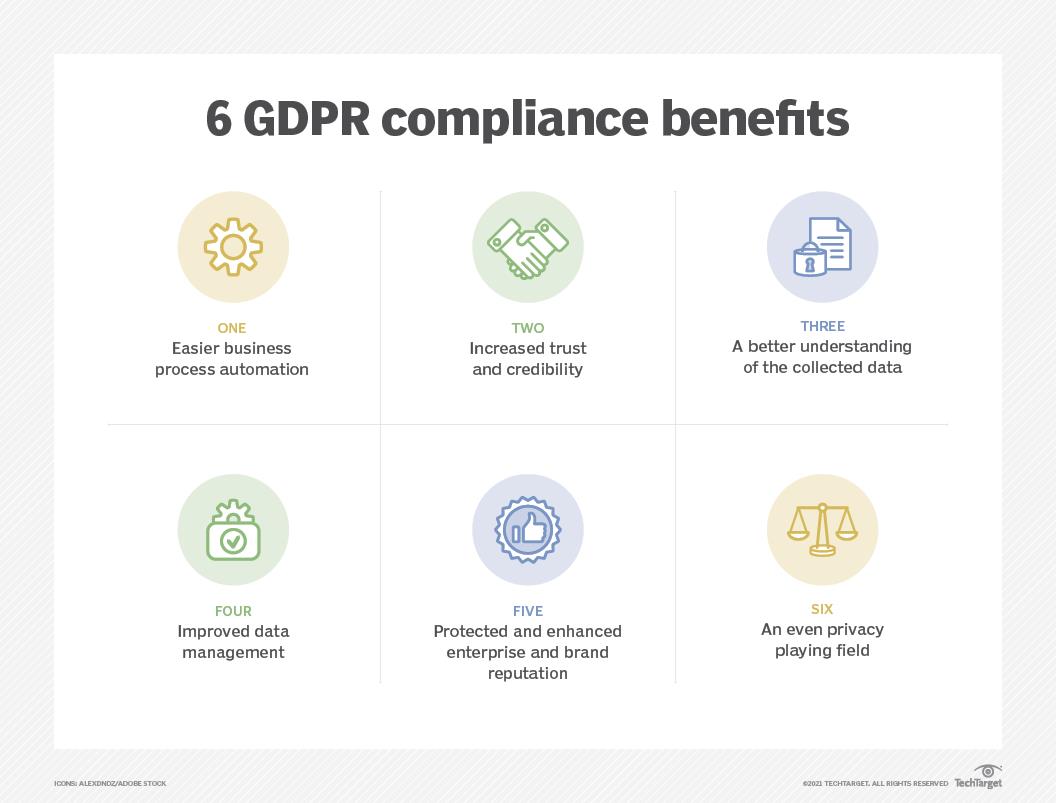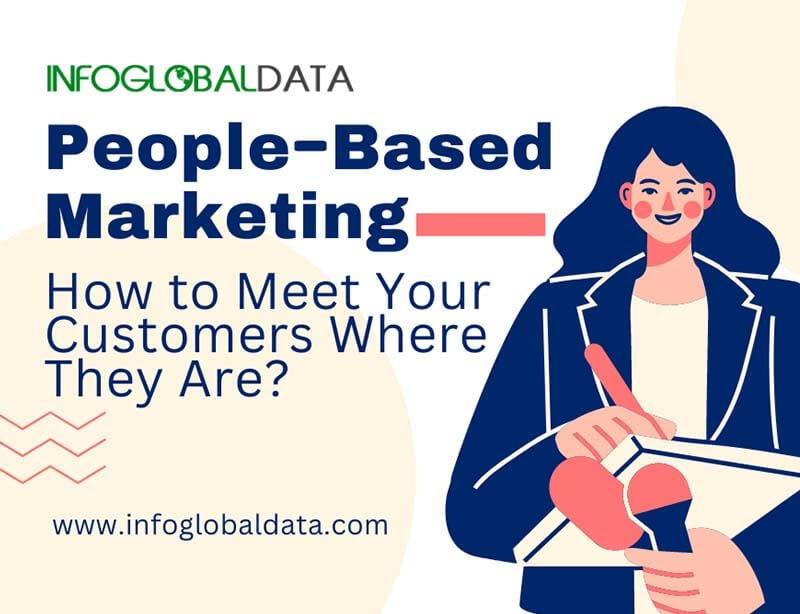What role does data privacy play for businesses?
As a B2B business provider, you are responsible for several parties' sensitive data, including your clients' customers, workers, and business partners. Any data disclosure would have terrible repercussions for anyone. It will put people at risk for identity theft, fraud, and other illicit actions and cost clients' businesses a fortune regarding customer trust, cyberattacks, data loss, and public perception. To avoid these repercussions, businesses of all sizes require more dedication to data protection from the software providers they work with. Here are the types of data privacy depicted in the picture below.
The Current Data Privacy Legislations! What is stored next?
Four other states—Virginia, Colorado, Utah, and Connecticut—approved their omnibus privacy laws between 2021 and 2022, apart from CCPA, GDPR, HIPPA, and other active privacy legislation. Earlier legislation gave companies up to two full years to get ready for enforcement, but more recent state privacy laws have often dramatically cut the on-ramp.
In 2023, the following five state-level privacy legislation will take effect:
- Beginning on January 1, 2023, Virginia's Consumer Data Protection Act (VCDPA) and California's amended California Privacy Rights Act (CPRA) take effect.
- Beginning on July 1, 2023, the Colorado Privacy Act (CPA) and the Connecticut Data Privacy Act (CTDPA) will go into force.
- On December 1, 2023, the Utah Consumer Privacy Act comes into force.
The best time is to begin right now, whether you need to change your marketing techniques to comply with new compliance requirements or your business is just starting to think about its privacy program. Most marketers today struggle with the ever-growing pressure from data and privacy requirements and the consumers' demand for personalized experiences. Delivering a more tailored experience requires first-party data, but how can marketers get and use customer data while remaining compliant? Follow up the next segment to know about the strategies.
The 5 best strategies for marketers to comply with data privacy policies
When a data breach occurs, anything could happen because it could end up in the wrong hands. Firstly, a data breach could expose a company's private information to its competitors.
Secondly, a data breach involving official information could provide the enemy state access to top-secret information about the country.
Thirdly, a breach at a hospital might give unauthorized access to protected health information (PHI), which they could then exploit for their purposes.
Why is confidentiality so crucial? Before, this wasn't a significant deal. Previously, businesses did not give it much thought. Because they get a lot of data daily from their customers, practically all large companies and SMEs are now concerned about data protection and privacy compliance. Here are the strategies to help marketers.
1. Determine what private information your company gathers and keeps.
Identification of the personal data that your company gathers and retains is the first step in data privacy compliance. This will assist you in identifying the laws and rules your company must abide by regarding data privacy. Personal and sensitive personal information are the two main categories of personal data organizations gather and maintain. It is simpler to decide what data privacy standards your organization must adhere to the more specific you are about the types of data your company gathers and retains.
2. Create a new version of your data privacy policy
A data privacy policy is a document that details how your company gathers, maintains, and uses the personal data of its clients. It is a crucial component of compliance since it demonstrates to clients your concern for their privacy. If you were to be sued for breaking the law, it safeguards your company against legal action. A data privacy policy may not be needed by law, but it is advised by experts regardless of what local rules and regulations your firm is subject to. This is because a data privacy policy increases business transparency and shields clients from improper usage of their personal information.
Medical Professional Lists
Contact Us for Marketing Campaigns
3. Determine which laws apply to you
Even if some marketing teams work from physical locations and only cover a small area, marketing is a field that is becoming more and more remote. Even if your base of operations is in New York, you can still provide a client in Seattle with first-rate marketing services. You need to be particularly aware of any legal requirements that may be relevant to your organization, given the remote nature of the marketing job. Governments other than the U.S. and the EU also have laws governing data privacy. You may understand your present compliance duties and any changes coming your way using the IAPP's global privacy map and state privacy legislation tracker.
4. Increase first-party data collecting program by fostering trust
For years, digital marketers have gotten by on user information obtained from third-party cookies, but soon that won't be viable. In the future, businesses will need to create databases from shared personal information obtained directly from data subjects, known as first-party data. But remember that you have a more outstanding obligation to protect consumer data as the first-party data pipeline runs from your consumers to you. The need for an effective privacy program is considerably greater. That entails utilizing it sensibly, following notices and laws, posting your information conspicuously, and complying with other privacy requirements.
5. Inform your team about the importance of data privacy compliance
Lastly, you must educate your team on data privacy compliance. Employees who are not adequately trained may misuse data and violate privacy laws. You must teach your workers about obedience to avoid these problems. This can be accomplished by holding a training session and including it in the recruit orientation. It might be challenging to understand and keep up with the rules and regulations. But it is possible, and it's crucial to act before it's too late. It's preferable to get started on compliance preparations as soon as feasible. You will surely follow compliance if you stick to these suggestions.
Build trust and continue to prioritize data privacy
Consumers today, while utilizing search engines, social media, credit cards, or pretty much anything else, have very little control over their data because of the prevalence of big data. Include these data privacy procedures that gradually give users more control over their personal information and increase customer confidence. Keeping data private requires ongoing effort. It is a never-ending circle. To make sure your standards are up to date with the most recent regulatory developments and are effective, frequently audit your data privacy policies and practices.
It might be conceivable for organizations who know they must adhere to one law and don't plan to go out to other jurisdictions to manage compliance in-house. It will require time, money, and work, but it is doable. Exorbitant fines, legal troubles, loss of reputation, and other things can happen if data privacy regulations are broken.
Moreover, it's uncommon for businesses nowadays to focus their efforts on a single market; as a result, you can be operating in countries with varying data privacy regulations and lack essential controls. For this reason, it's crucial to develop a thorough data privacy policy – a binding legal document on your website or app that explains how you collect, handle, and utilize users' data. A well-written privacy policy is a clear and concise approach to describing how your website or app contains data, the types of data it acquires, and the purposes for which it will be used.
